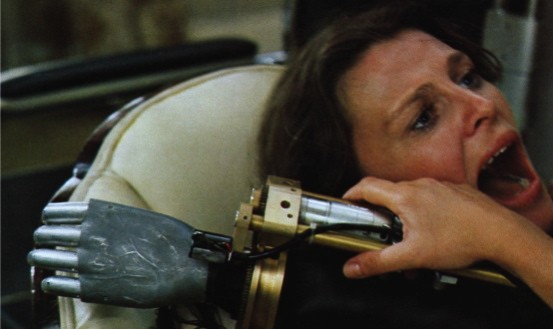COMPUTER AGE — EARLY COMPUTER MOVIES, 1952-1987: DEMON SEED (Donald Cammell, 1977)
Museum of the Moving Image
35th Ave. at 36th St., Astoria
Friday, November 15, $12, 7:00
718-777-6800
www.movingimage.us
 Based on the novel by Dean R. Koontz, Donald Cammell’s creepy, claustrophobic 1977 futuristic thriller Demon Seed offers a very different look at motherhood. The film stars a surprisingly game Julie Christie as Susan Harris, a frustrated housewife whose husband, Alex (Fritz Weaver), is the leader of a team that has built a master computer known as Proteus (voiced by Robert Vaughn). When Alex goes off for several months to further Proteus’s already impressive attributes, the supercomputer starts developing a mind of its own, locking Susan in the house and deciding she must give birth to its child. Cammell, who codirected Performance with Nicolas Roeg, fills Demon Seed with trippy, psychedelic visuals and cool technological flourishes, along with an electronic score by Ian Underwood and Lee Ritenour supplementing Jerry Fielding’s central musical themes. The film delves into suburban paranoia with Toffler-esque flare and an Orwellian fear of artificial intelligence. The film harkens back to Stanley Kubrick’s 2001: A Space Odyssey and Joseph Sargent’s Colossus: The Forbin Project while influencing such future films as John Badham’s WarGames, which also names its supercomputer “Joshua” and casts Weaver look-alike John Wood as computer creator Dr. Stephen Falken. Demon Seed is screening with Ron Hays’s 1981 Earth, Wind & Fire video Let’s Groove on November 15 at 7:00, kicking off the Museum of the Moving Image series “Computer Age: Early Computer Movies, 1952-1987,” which continues through November 17 with such other computer-prescient films as Steven Lisberger’s Tron and Nick Castle’s The Last Starfighter, several shorts programs (including one featuring works by Larry Cuba, John Whitney, and John Whitney Jr.), and a conversation with computer artist Lillian Schwartz.
Based on the novel by Dean R. Koontz, Donald Cammell’s creepy, claustrophobic 1977 futuristic thriller Demon Seed offers a very different look at motherhood. The film stars a surprisingly game Julie Christie as Susan Harris, a frustrated housewife whose husband, Alex (Fritz Weaver), is the leader of a team that has built a master computer known as Proteus (voiced by Robert Vaughn). When Alex goes off for several months to further Proteus’s already impressive attributes, the supercomputer starts developing a mind of its own, locking Susan in the house and deciding she must give birth to its child. Cammell, who codirected Performance with Nicolas Roeg, fills Demon Seed with trippy, psychedelic visuals and cool technological flourishes, along with an electronic score by Ian Underwood and Lee Ritenour supplementing Jerry Fielding’s central musical themes. The film delves into suburban paranoia with Toffler-esque flare and an Orwellian fear of artificial intelligence. The film harkens back to Stanley Kubrick’s 2001: A Space Odyssey and Joseph Sargent’s Colossus: The Forbin Project while influencing such future films as John Badham’s WarGames, which also names its supercomputer “Joshua” and casts Weaver look-alike John Wood as computer creator Dr. Stephen Falken. Demon Seed is screening with Ron Hays’s 1981 Earth, Wind & Fire video Let’s Groove on November 15 at 7:00, kicking off the Museum of the Moving Image series “Computer Age: Early Computer Movies, 1952-1987,” which continues through November 17 with such other computer-prescient films as Steven Lisberger’s Tron and Nick Castle’s The Last Starfighter, several shorts programs (including one featuring works by Larry Cuba, John Whitney, and John Whitney Jr.), and a conversation with computer artist Lillian Schwartz.
